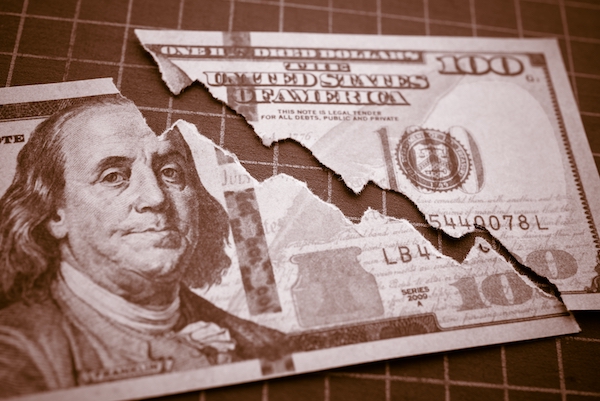What does the Fed recent interest rate cut signal about the current state of the US economy?
 Let me introduce the subject with a joke.
Let me introduce the subject with a joke.
Einstein dies and goes to heaven. St. Peter greets him effusively and says, "Unfortunately, Mr. Einstein, because we're a centrally planned economy —for obvious reasons— we have a temporary housing shortage, and have to put you up with three roommates for a while."
Einstein goes to his new apartment, and the first guy comes up to him and says, "Mr. Einstein, I have an IQ of 130, and I'd love to get to know you better." Einstein says, "Great. After lunch, let's bounce around a few concepts of astrophysics that have been on my mind."
The second guy comes up and says, "Mr. Einstein, I'm not as smart as that first guy. I've only got an IQ of 100, but I still want to get to know you better." Einstein says, "Great. Let me put away my grip, and let's play a game of chess."
The third guy comes up and says, "Mr. Einstein, I'm not as smart as those other guys. I've only got an IQ of 70, but I still want to get to know you." Einstein says, "So, where do you think interest rates are headed?"
That says a lot about guessing the direction of interest rates, but they're actually the most important single indicator in an economy. Rates are the price of capital, the lifeblood of an economy. Interest rates are analogous to blood pressure and pulse readings for a human. When a central bank lowers rates, it's equivalent to giving a human amphetamines; when they raise them, it's like a dose of barbiturates. Central bankers are like a quack doctor, poisoning the economy by distorting economic signals.
I understand why Trump wants lower interest rates. They encourage people to buy things, consume, and borrow money. That increases consumption, business earnings, and employment.
Amphetamines also give a great artificial high. But low rates discourage saving, and without saving, there's no capital. The immediate and direct consequences of lowering rates might be an artificial boom. But the indirect and delayed consequences are a very real bust.
Interest rates should not be dictated by politicians and bureaucrats. Borrowers and lenders will arrive at the "correct" level of rates.
Not only shouldn't the Federal Reserve have mandates—it should be abolished. Unfortunately, it's become so intertwined with the economy that people now believe it's part of the cosmic firmament. The Fed determines the amount of money and credit, its cost, and the way the banks operate. It finances the government's debt, which is especially important since the government is bankrupt. But I hate talking about what "should" happen; "should" only happens in a dream world.
Initially, the Fed only had one mandate: price stability, which was a ridiculous lie. Then, maximum employment became the second "traditional" mandate. And now they've taken on a true impossibility: controlling long-term interest rates.
 Since the Fed was created, the dollar has lost over 95% of its value. Forget about price stability; the general price level has gone up by a factor of over 20, which is a total and abject failure. The Fed is necessarily an engine of inflation, a means of printing money.
Since the Fed was created, the dollar has lost over 95% of its value. Forget about price stability; the general price level has gone up by a factor of over 20, which is a total and abject failure. The Fed is necessarily an engine of inflation, a means of printing money.
As for the second mandate, maximum employment, the way to create it is laissez-faire. That means low taxes, low regulations, and sound money. They've totally failed at that as well.
And now, idiotically, they're talking about lowering long-term rates. That's impossible, because the only way the Fed can lower long-term rates is by buying massive amounts—many trillions—of long-term bonds. But they can only do that by creating trillions of new fiat currency. Bond prices will fall to new lows, and interest rates will rise to new highs.
These people don't have a clue about economics or the way the world works. Trump wants to pack the Fed with puppets who will print money, vainly trying to keep interest rates below the rate of currency debasement. The result will be a catastrophe.
For the average American—someone with a mortgage, some savings, maybe a 401(k)—how do these potential shifts in Fed policy translate into real-life consequences?
The answer is a lower standard of living, class warfare, and eventually chaos. Among many other things, the average American and his leaders don't understand the relationship between borrowing and savings. Unless there are savings—people producing more than they consume and putting aside the difference—there can't be borrowing. If there are no savings, there's nothing to borrow, so they have to liquidate capital saved by past generations, or mortgage their future.
As for what you should do, with 30-year mortgage rates around 6%, should you get a mortgage or not? Let me refer you back to the joke I told a few minutes ago. But if you can get a 30-year 6% mortgage now, I'd do it. Long-term rates are headed up, and the dollars you owe will depreciate.
But in the kind of chaos that's being created in the world today, on many fronts, your best investment is in yourself. It's critical that you and your family have as many skills and abilities as possible. No matter how things sort out, you want to be in a position to  survive and prosper. I urge you to get my new book, The Preparation. It covers a host of things that most people haven't even considered.
survive and prosper. I urge you to get my new book, The Preparation. It covers a host of things that most people haven't even considered.
Sorry for the commercial, but I think it's important.
Comments powered by CComment